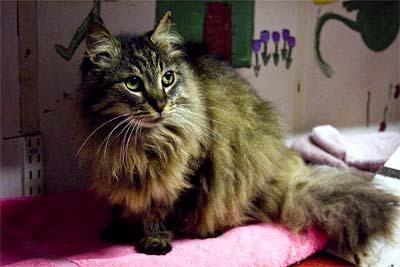By Cali Bagby
Times are harder for people and pets alike these days.
From San Francisco to Oklahoma to Connecticut — pet shelters across the U.S. are filling up with high numbers of abandoned or surrendered pets and San Juan is not immune.
The Animal Protection Society of Friday Harbor, a no-kill shelter that handles about 150 to 200 animals yearly, is at maximum capacity for cats — with 36 adults and three kittens.
Usually the winter puts APS between 28 to 31 felines. This month’s numbers are the highest Michelle Beachen, shelter operations manager, has seen in her five years working with these animals.
“More pets have been surrendered or abandoned due to the economy,” said Beachen. “People lose their house, and can’t afford a pet any longer.”
She would like to see 20 to 25 cats at the shelter not only for their physical and mental health, but to ease the workload on the staff.
Volunteers help provide shelter extra love and attention to the creatures during tough economic times.
BJ Brandlis and her daughter Jilly Brandlis have volunteered about twice a week for the last four years — socializing the shelter dogs with frequent walks.
“It’s great to see the dogs we have worked with here and come back and see that they’ve gotten adopted,” said BJ. “But we get attached, even after a couple of days, dogs are just so accepting.”
Lately they have been spending a lot of time with Happy, a white German shepherd, that certainly looks jovial with his pink tongue hanging out of his mouth after his stroll in the brisk, winter air.
When BJ starts talking about how the family is looking for a possible new “furry” addition to the family, Jilly’s eyes grow wide and she says in a wistful voice, “Happy is a good dog.”
For now BJ is content to bond with the five dogs at APS without having to worry about the full commitment of owning a pet.
Other volunteers come to the shelter to pet the variety of adult calicos, short-haired tabbies, and grey long-haired felines, which roam freely through a wide open room with heated floors and access to an outdoor pen.
Volunteers help, but the shelter staff would like to see the felines go home with a family, especially the older cats.
While younger cats get adopted within three to eight months, older cats can live at the center for years, Beachen said.
The poor economy also causes fewer people to adopt pets, which is why the shelter is offering half off the adoption of any felines.
Older cats are ideal pets because they have already developed their personality so owners know what they are getting, and they are more compatible with a family with a young child, according to the Canadian Federation of Humane Societies.
Adopting an older pet doesn’t mean you won’t spend a long time together as some cats can live up to 22 years, Beachen adds.
As much as she’d like the animals to find new owner, Beachen loves the fact that APS provides animals with large indoor and outdoor spaces. She has seen other places where cats and dogs are trapped in tiny cages.
“I couldn’t imagine working anywhere else,” she says, gently scratching the ears of an orange cat named Oscar who immediately starts purring.
The APS visiting hours are Tuesday – Sunday 11 a.m. – 2 p.m.
For more info call 378-2158 or email pets2homes@interisland.net, or visit www.apsfh.org.



